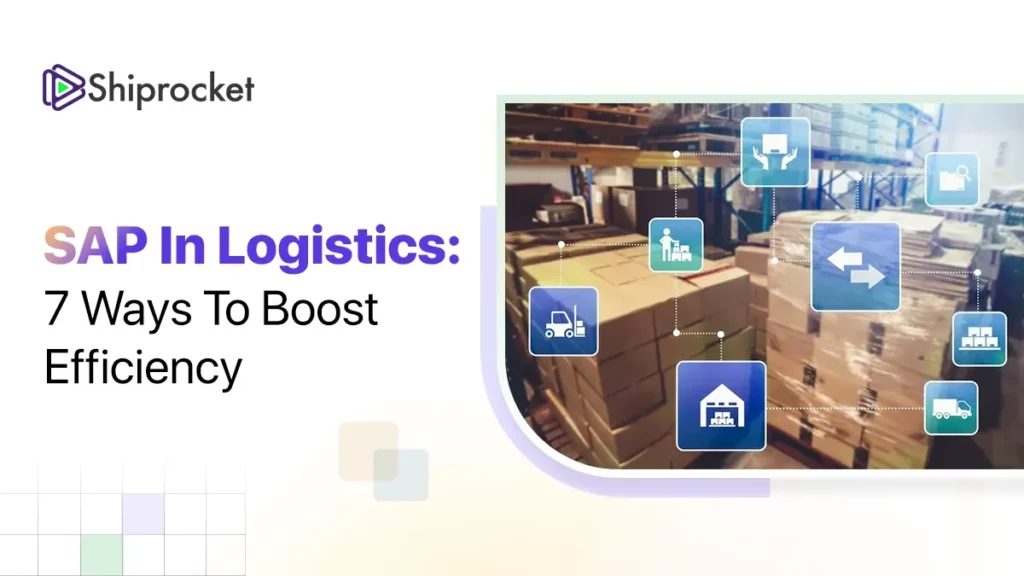SAP Logistics: Types, Benefits, Solutions, & Strategies
Businesses are constantly seeking techs and strategies to improve their logistics to remain competitive. This is where logistics management solutions come in. Whether you’re a small or global enterprise, SAP is a reliable, all-inclusive system that makes handling logistics easier.
It consolidates all of your logistical data into a single system that different departments of the supply chain can use in real time. SAP ensures that every element of your logistics is always up to date. It proves to be a market leader in assisting transportation managers to optimise their logistics.
Here, we’ll talk about SAP in logistics and how it fits into your supply chain. We’ll also talk about how it could assist you in keeping up with the ever-changing logistics settings.

The Role of Logistics Management Metrics
Logistics management is concerned with the transportation of goods from manufacturers to buyers. Businesses use a number of metrics and key performance indicators to assess how well this process is working. These metrics allow you to monitor every element of the supply chain and make educated decisions to achieve better results.
These indicators are critical for your business. They show how well you serve client demands, improve supply chain efficiency, and manage your budget. It can assist you in identifying areas that require improvement and make modifications accordingly.
Inventory turnover is one example. It displays how rapidly you sell and restock goods. This is estimated by dividing the cost of things sold by the average inventory level. This is essential since it has an impact on your profits. A high turnover indicates that products sell quickly, whereas a low turnover indicates that items remain on the shelves for too long.
These measures, such as inventory turnover, are particularly valuable in the field of logistics.
Key Business Objectives in Logistics Management
Logistics management plays a critical role in achieving various essential business objectives. These objectives are integral to a company’s efficient operation and market competitiveness.
Minimise Manufacturing Costs
Logistics management significantly reduces a company’s production expenses. Effective logistics management ensures efficient material handling and transportation, reducing shipping costs. For example, careful transportation planning and alternative routes enhance delivery efficiency, increasing profitability.
Efficient Flow of Operations
Logistics management ensures a smooth production process by optimising communication between various departments and fostering a well-planned strategy for efficient operations.
Better Communication
To avoid miscommunication and resource loss, logistics management entails collaborating with both internal departments and external partners.
Better Inventory Management
Inventory control is optimised through logistics management, which also minimises the danger of shortages, keeps appropriate stock levels, and cuts down on unnecessary expenditure.
Improve Supply Chain Efficiency
Logistics management improves total efficiency by streamlining processes, cutting expenses, guaranteeing on-time delivery, and increasing supply chain visibility.
Fulfill Customer Requirements
Planning transportation options and inventory availability, ensuring timely delivery, raising customer happiness, and establishing a brand’s reputation are all part of logistics management’s goal to satisfy customers.
Reduce Operational Cost
Through revenue-generating operations, route planning, and productivity optimisation, logistics management reduces supply chain costs.
Reduce Carbon Footprint
Logistics management promotes eco-friendly practices, such as optimising routes, workflow automation, and sustainable logistics solutions to reduce carbon emissions.
Differentiating Logistics and Supply Chain Management
Supply chain management (SCM) and logistics are two essential components of contemporary corporate operations. Supply chain management involves various parties to ensure effective commodities movement from suppliers to consumers, whereas logistics management concentrates on internal goods handling inside a company.
The following table outlines the main distinctions between supply chain management and logistics:
| Key Differences | Logistics Management | Supply Chain Management |
|---|---|---|
| Scope | Logistics management is mostly concerned with a company’s internal operations. It involves the transportation, storage, and inventory control of items within the company’s facilities. | SCM involves overseeing the entire flow of goods and services. SCM professionals work with suppliers, distributors, and customers to ensure that raw materials are efficiently transformed into finished goods and reach consumers on time and at a competitive price. |
| Primary objective | Logistics management ensures that goods are transported in a timely and effective manner, ensuring that the organisation’s internal operating requirements are met. | The primary goal of SCM is to acquire a competitive advantage in the market. It optimises the whole supply chain network for customer delivery, focusing on customer loyalty and profitability. |
| Number of Organisations Involved | Logistics management is often handled within one organisation, handling logistics internally for effective goods management within its facilities, such as warehouses and distribution centres. | SCM requires cooperation among suppliers, middlemen, distributors, and customers. It focuses on collaboration and coordination among them. |
| Relationship | Logistics management is a part of the supply chain. It is concerned with the effective processing of goods inside a business. It’s similar to the internal logistics piece of a larger supply chain layout. | Supply chain management deals with the whole supply chain, from suppliers to customers, and involves commodities, services, information, and money. It takes a strategic view of the larger picture, emphasising seamless synchronisation. |
Types of Logistics Management Systems
The following are the types of logistics management systems:
Inbound Logistics
Inbound logistics is the process of transporting, receiving, and storing raw materials and other resources that your company needs to produce its products. It is one of the most important aspects of the supply chain, as it ensures that your company has the essential resources to operate efficiently and effectively.
Outbound Logistics
Outbound logistics is the process of delivering finished products to customers. It is a key part of the supply chain and plays a vital role in customer satisfaction. Businesses should carefully plan and execute their outbound logistics operations to ensure that customers receive their orders on time and in good condition.
Reverse Logistics
The process of returning items from the buyers to the seller is known as reverse logistics. It is crucial for business owners to have a reverse logistics strategy in place to manage returns, replacements, and recalls. It is an essential component in the supply chain that enables companies to improve customer satisfaction and recover value from returned goods.
Third-Party Logistics (3PL)
Third-party logistics (3PL) companies are experts in transporting goods and merchandise from one location to another, primarily focusing on shipping products from sellers and suppliers and ensuring that goods arrive at the correct locations on schedule. Businesses of all sizes can benefit from working with 3PL companies. 3PL providers allow businesses to boost productivity, lower expenses, and invest in other significant business operations.
SAP Logistics Management and Its Advantages
The SAP in logistics links suppliers and buyers, simplifying communications and automating supply chains. From order fulfillment and transportation to production scheduling and inventory management, it offers a single, unified overview of each component of the supply chain.
Benefits of SAP in Logistics:
- Inventory Management: SAP is a tool that aids in managing inventory and maintaining ideal stock levels with real-time tracking and management of inventory.
- Streamlined Operations: SAP’s logistics solutions can help automate and streamline order processing. This can help businesses get customer orders more quickly and efficiently. improving customer satisfaction.
- Supply Chain Visibility: SAP can help brands gain greater visibility of their supply chain operations, which can lead to better decision-making, meeting customer demand promptly, and improved collaboration with suppliers.
- Transportation Management: SAP in logistics can help businesses to optimise the best routes, reduce transportation costs, and ensure on-time delivery of goods.
- Warehouse Management: SAP’s warehouse management system (WMS) enables businesses to improve the efficiency and accuracy of their warehouse operations, which can lead to improved customer service and increased visibility.
- Cost Reduction: SAP can help organisations reduce operational costs, including labour, transportation, and inventory carrying costs, by automating and optimising logistics processes.
- Compliance and Reporting: SAP in logistics can also help facilitate compliance with industry regulations. It allows us to keep a check on the performance analysis of operations and compliance with auditing requirements with the help of comprehensive reports.
Revolutionising and Redefining Logistics for Operational Excellence with Shiprocket
Within the dynamic realm of eCommerce, Shiprocket emerges as a beacon of innovation and reliability. Leveraging cutting-edge AI technology, Shiprocket is actively reshaping the eCommerce landscape.
Shiprocket empowers eCommerce enterprises to meet and exceed customer expectations, optimising operational efficiency and ensuring unparalleled satisfaction. In the context of SAP in Logistics, Shiprocket exemplifies the pivotal role of logistical innovation in elevating the customer journey and operational excellence.
Conclusion
Effective logistics management is crucial to lowering manufacturing expenses, enhancing communication, ensuring timely product delivery, meeting customer demands, and streamlining overall processes. Logistics is focused on the movement of commodities within a company. Businesses can use SAP logistics software to enhance inventory management and save manufacturing expenses.
Logistics management techniques help businesses reduce operating costs by optimising the supply chain, enhancing route planning, and improving transportation, warehousing, and inventory management.
Reverse logistics can be improved by the following practices:
1. Defining clear return guidelines.
2. Enabling clients to return items seamlessly.
3. Effectively processing returned goods.
4. Checking the causes of returns to pinpoint areas that need improvement.
SAP’s SCM (Supply Chain Management) software is designed to help organisations optimise and manage their supply chain operations. It is a suite of integrated applications and modules that address various aspects of supply chain management.








